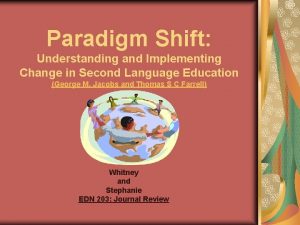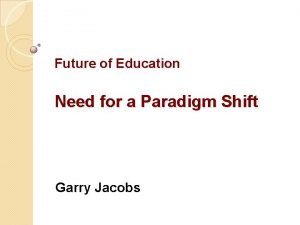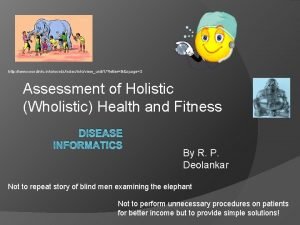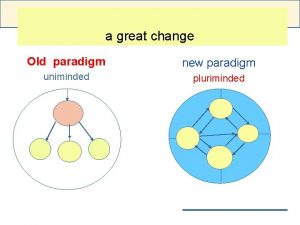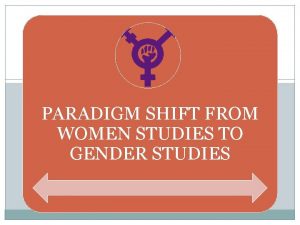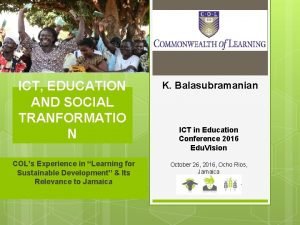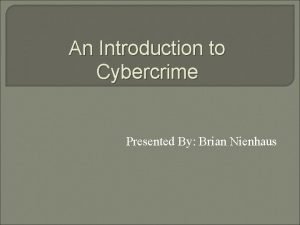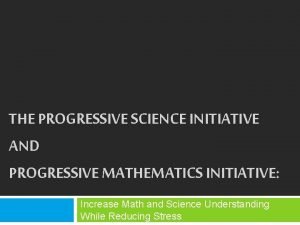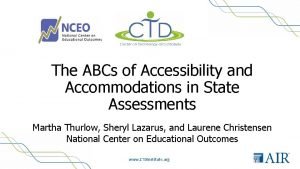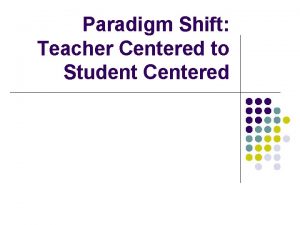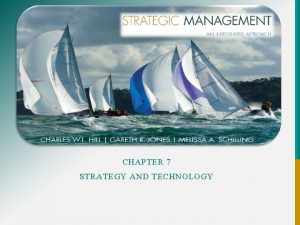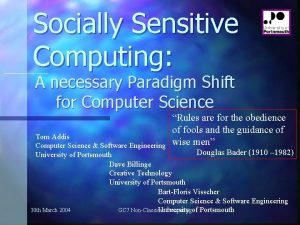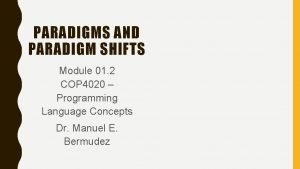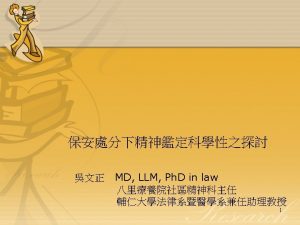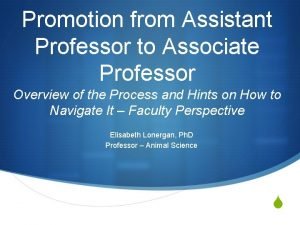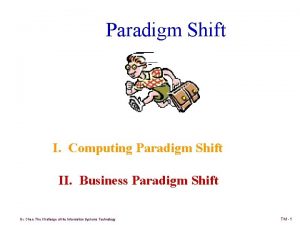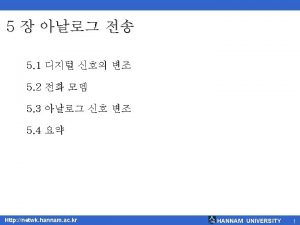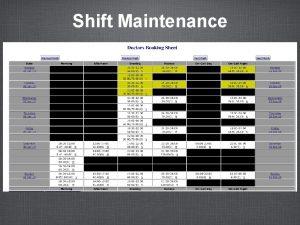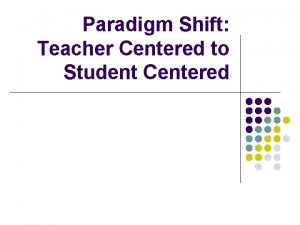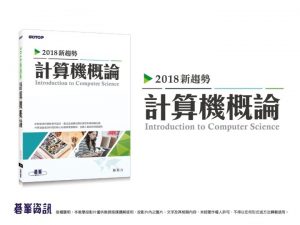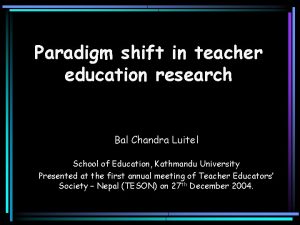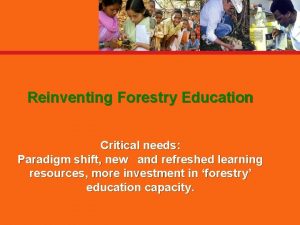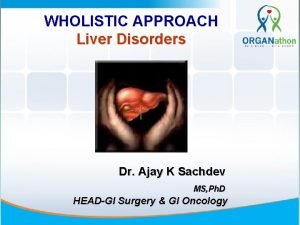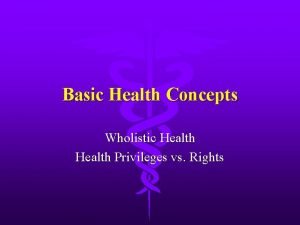PARADIGM SHIFT IN EDUCATION for wholistic impact Professor
















- Slides: 16

PARADIGM SHIFT IN EDUCATION (for wholistic impact) Professor Dankit Nassiuma AFRICA INTERNATIONAL UNIVERSITY GMC CONFERENCE 2020 - 13/10/2020

Change § Nothing is permanent---except God § Shifts can be slow or fast and possibly violent. So people fear shifts. • A paradigm shift is a radical change that • guides interaction with society…. worldview • affects values, relations • impacts the mind (thoughts), the soul (emotions) and the spirit.

Education § potentially affects one’s spirituality § productivity, and relations § can shape one’s worldview, thinking and emotional stability § Can affect the conduct and behaviour, communication, and personal development § A wholistic impact on human life, and relations through education cannot ignore God’s centrality

PARADIGM SHIFT IN EDUCATION • A paradigm shift in education is a radical change in the educational principles and philosophies, curriculum, and instruction methods • Paradigm shifts in education are based on • either a godly worldview or a humanistic worldview • These are then channelled through üGlobalization üsocial-economic and political changes, ütechnological innovations, ücurriculum and instruction methods. • While education today is mostly about the system, content, and mastery; education in the future will be about the learner, the process, and skills.

Historical view § Formal education was mostly initiated by the Church a. learning to read scriptures and spread the gospel b. instilling and passing on godly values to the next generation c. To develop skills for ministry and service to society § Through the 20 th century up to now, several paradigm shifts in education have taken place at basic and higher education levels üdriven by humanistic thinking without God in human affairs. üeducational philosophies, Curriculum and instructional methods that undermine God are then instituted …leading to human conflicts and wars, poverty, immorality ØExamples: üthe theory of evolution, üsexual and reproductive education, üschemes to disconnect science from God, ü schemes to remove God from education, development and from human eternal destiny. üBut people are desperately searching for meaning and hope in life…seeking for a stable an anchor to hold onto…where can they find it?

A Stable Anchor for our times “The LORD is exalted, for He dwells on high; He will fill Zion with justice and righteousness, AND HE will be the stability of your times, abundance of salvation, wisdom, and knowledge; the fear of the LORD is Zion’s treasure. ” (Isaiah 33: 5 -6). • An effective paradigm shift in education a. has to lead to a wholistic impact on people and society b. has to be anchored on God…on the fear of God c. has to lead to high moral values, justice, righteousness in relationships, salvation (an eternal perspective), and impactful productivity. • But this is not easy…in a humanistic society that is has no humanity

CURRENT CHALLENGES IN EDUCATION q. Good certificates; Wealth, and power without godly values, character, skills. q. Preference of knowledge and technical skills over human values and relations. q. Educated but unable to relate, communicate and bring transformation in society q. Gap between skills that employers seek and skills that graduates possess.

CHALLENGES q misuse of education for theft and deception, unethical practices q increasing cost of formal education, shrinking job markets for graduates and competition for limited places q increasing ICT that can be accessed by everybody…and yet teaching with old methods q weak management and leadership systems… and institutions becoming part of the ‘global knowledge economy. • These challenges lead to a growing number of people questioning the purpose and viability of the current education framework.

Paradigm Shifts Four fundamental areas: i. iii. iv. Policies and their drivers Financing Curriculum and Instruction Educational Management

a) Educational Policies and drivers • Currently driven mostly by • • Political interests and Financial goals Humanistic but inhuman agenda A top down system that almost ignores the major stakeholders-learners and teachers Globalization of education and the development of lifelong learning as a human right • A shift to address the interests of God’s kingdom • To exert moral standards and build good values? • To help rethink the goals of education • To give education a human face in its content • To protect education from being used as a tool for self-destruction • How can the Church enhance the shift? • Needs moral authority to claim back its position in schools • Use its capacity to work from the grassroots and basic education

b) Financing of education 1. A shift for Governments to make education affordable and accessible, but…is this politically expedient? üChurch sponsored institutions used to be affordable…high quality…the Church needs to reclaim the moral authority to influence governments üso that education is affordable, wholistic and of high quality “Whoever controls knowledge in higher education may ultimately control the world…in a knowledge and technology economy… we’re standing on the edge. ” 2. A shift in the body of Christ to invest in transformative education… üto shape the minds, values and eternal destiny of many generations… ØWhere can the Church pluck in? Is this its priority?

c) Curriculum and Instruction methods There is a shift in demand for competencies and expertise, … and for education to have a wholistic impact, … When God is left out of the curriculum, § it’s then driven by selfish interests with a humanistic agendas § Godly values are undermined and individualism promoted…so there has to be a radical shift to anchor the curriculum on a stable base…that makes the learner human. . . and whole… • Technical and soft skills • Spiritual formation

• A shift to instruction models which take into account that • Education is no longer defined by what a teacher will teach (knowledge transfer) but in terms of skills, competencies and values acquired. • Recognizes talents and knowledge of the learners and more effective interaction and the teacher’s role is that of guide and mentor… • On philosophical foundations of education (Panzimino, 1997), He ranks spiritual values as the base and the top. Other values fall in between. • A shift to education training that equips teachers who are committed and of integrity as role models to the learners…who see teaching as a mission of God… The only reason that a Christian university like AIU trains teachers is so that Christ can be represented in classrooms.

d) Educational Management • The failure of educations to meet the current expectations of society is partly due to weak management and leadership in institutions… ülacking vision and passion for learners üMissing effective structures that are responsive to leaners needs üWeak policy implementation framework üPolitisized and divided systems • A shift in the management and leadership of education…to a missional framework is needed • if you keep doing the same thing, you can be sure that you will always get the same results.

What an we do? What can the Church do? Some practices taking place in Kenya include the following: 1. Training and discipling teachers and professionals from a missional perspective § by some Christian institutions- instilling a kingdom worldview. 2. Enhancing Sunday school bible and life skills teaching at all levels by the Church. 3. Developing community based discipleship, youth ministries and trainings on kingdom development 4. Building an effective and united Church and para-Church advocacy with policy makers in education.

CONCLUSIONS • Maybe the starting point towards wholistic impact through education is to have a paradigm shift in the Church and Christian organizations, Øas a key stakeholders in education, … regarding ütransformative education üits responsibility as the moral custodian of godly values üits priority towards financing education • Communities and nations are transformed when the kingdom of God is established in them…a clarion call for transformative Christian education
 Paradigm shift in education
Paradigm shift in education Paradigm shift in education
Paradigm shift in education Holistic vs wholistic
Holistic vs wholistic Old paradigm
Old paradigm Paradigm shift from women studies to gender studies
Paradigm shift from women studies to gender studies Paradigm shift from pedagogy to andragogy to heutagogy ppt
Paradigm shift from pedagogy to andragogy to heutagogy ppt Brian nienhaus
Brian nienhaus Njctl math
Njctl math Paradigm shift in technology
Paradigm shift in technology Paradigm shift teacher-centered to student-centered
Paradigm shift teacher-centered to student-centered Paradigm shift in technology
Paradigm shift in technology Paradigm shift meaning
Paradigm shift meaning Paradigm shift example
Paradigm shift example Paradigm shift kuhn
Paradigm shift kuhn Promotion from associate professor to professor
Promotion from associate professor to professor Spectroscopy principle
Spectroscopy principle Aniline uv spectrum
Aniline uv spectrum
